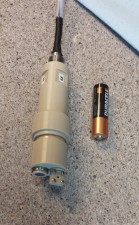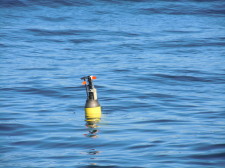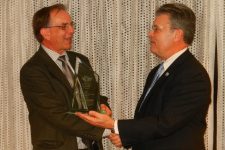
The NOPP Office is excited to announce that the 2014 NOPP Excellence in Partnering Award has been awarded to the project team “Development of an integrated ISFET pH sensor for high pressure applications in the deep-sea.” The project is led by Dr. Kenneth Johnson from the Monterey Bay Aquarium Research Institute (MBARI), with co-PIs from Scripps Institution of Oceanography, University of Washington, and Honeywell, Inc. The project was funded through the National Science Foundation (NSF), with additional support from a combination of non-profit and academic institutions, as well as a Fortune 100 Corporation. The project was nominated by the NSF for its ability to provide “high precision and accurate pH measurements from an array of profiling floats that can last for the five year life of a float” and for advancing “our understanding of the impacts of ocean acidification.”

The “Deep-Sea Durafet pH” sensor, developed by the team after several years of engineering and testing, is a prototype that now operates to 2000 meters depth and is expected to become commercially available for other ocean research projects and education. This robust and stable sensor will enable autonomous monitoring of ocean pH, especially as it relates to pH changes driven by increasing atmospheric carbon dioxide. Deep-Sea Durafet pH sensors are currently operating on profiling floats and CTD/Rosette samplers, where they are producing high quality pH profiles.

The NOPP Excellence in Partnering Award was presented at the American Geophysical Union fall meeting by Mr. Craig McLean, NOAA Deputy Assistant Administrator for Programs & Administration.
The NOPP Office would like to congratulate Dr. Kenneth Johnson (Lead PI), Robert Carlson, Honeywell, Inc. (Co-PI), Todd Martz, Scripps Institution of Oceanography (Co-PI), Stephen Riser, University of Washington (Co-PI) and their teams on this successful project and partnership! The NOPP Office would also like to extend their congratulations to the agencies that contributed to the project!

